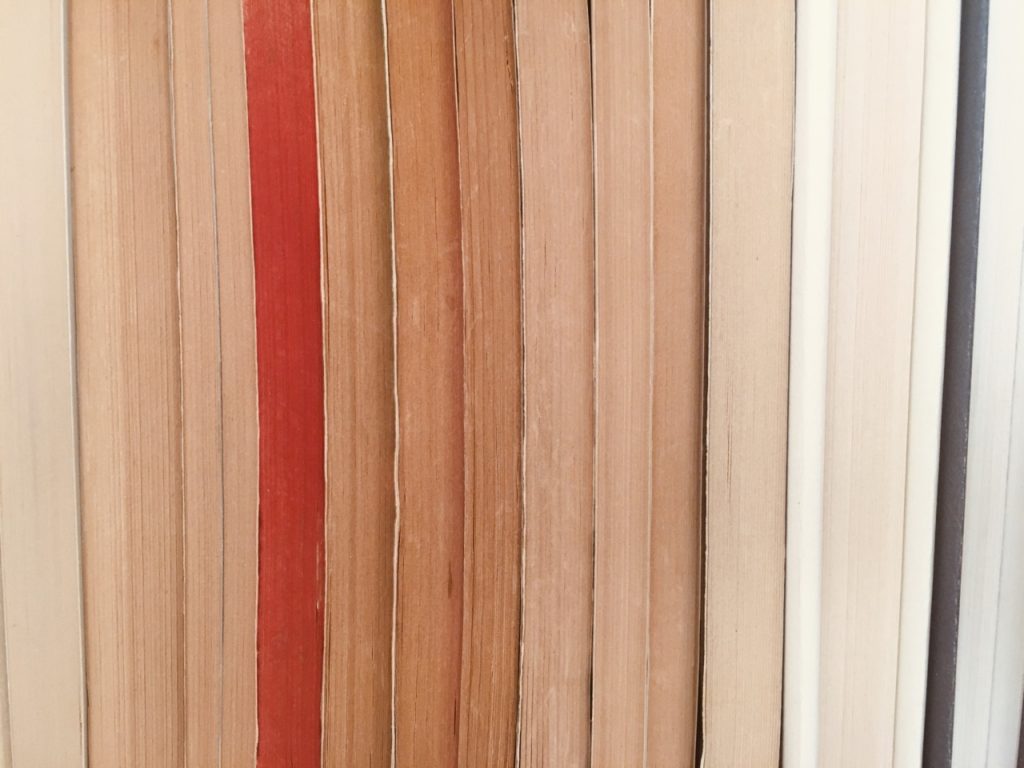Letter to the Editor: Right Where I Itch
To send a letter to the editor, simply write in. You’ll get a reply and we’ll anonymise any blogged version.

Reader U writes:
I’m a new subscriber and after reading Issue 16 I have to say this Henry Gibbs fella is scratching me right where I itch. How can I read more of his notes?
He reminds me of Mark Boyle, whose The Way Home: A Life Without Technology is certainly worth a read.
Kind regards,
U
*
Thanks!
He’s the real deal, our Henry. His column appears in Issues 14, 15, 16 and (this coming December) 17.
14 is available only in digital;
15 is available in digital, but if you wait there will be some shop returns;
16 is still available in print;
17 will be available to pre-order next month.
We like Mark Boyle here at the magazine too, and I happen to know that The Way Home is one of the few books Henry himself owns a copy of.
RW
Letter to the Editor: We Don’t Need Amplification
To send a letter to the editor, simply write in. You’ll get a reply and we’ll anonymise any blogged version.

Friend R writes:
Hi Rob,
I thought you might be interested in what I’ve seen happening to abandoned offices in the last couple of years. Loads of them in Glasgow city centre are being used for the arts, which is great but it feels and looks very strange!
The brass band I’m in rehearses on the second floor of an office. We don’t need amplification, just space and nobody to complain about the noise, so it works really well for us. The same office hosts loads of other bands, some pottery people, some actual artists with clay and oils etc, crafty types and there’s something to do with protesting and foodbanks as we can see their tinned goods and flags neatly organised into piles in their bit.
It’s a weird atmosphere though, as we still have the strip lighting, the lanyard-operated entry gates, the grubby turquoise carpets, the unopenable windows with cream-coloured blinds and piles of adjustable office chairs and bits of desk stacked up in every corner.
Anyway, [the newsletter was a] great read as always, and hopefully catch up soon!
*
New Escapologist Issue 16 is now available in our online shop, in print and digital formats.
Letter to the Editor: Sabbatical
To send a letter to the editor, simply write in. You’ll get a reply and we’ll anonymise any blogged version.

Reader A writes:
Hi Robert,
Thought I’d share that I’ve finally managed to commence a controlled escape from wage slavery in the form of a 12-month sabbatical starting in October, from which I may or may not return. An ideal option for a ‘feartie’ like myself.
Both of your books have played no small part in different ways with the first opening my mind up to escaping as a realistic possibility that should be planned for, the second helping to devise tactics to endure my own Concrete Island whilst putting the plan into action. A massive thanks!
Love the new issues. [After reading the books,] there’s some added bonus in receiving the latest copies in the post to then take on the train for the dreary commute!
*
Feartie nothing. A sabbatical is an excellent and time-honoured escape route. There must be something in the water, actually. Another reader wrote to tell me about a 6-month sabbatical they’re taking, and a hard-working friend of mine in Leicester is taking a year off too. Long may it continue.
Maybe your sabbatical will contain the seed of a longer-term escape. Maybe, on a quiet night at the movies or under the stars, you’ll have the epiphany required to extend the break — either for a while or indefinitely. But it doesn’t have to be a gateway to greater things if you don’t want it to be or if that’s impractical. Let your sabbatical be its own adventure. Twelve months is a phenomenal result. Nice one.
Letter to the Editor: Chilling Stuff
To send a letter to the editor, simply write in. You’ll get a reply and we’ll anonymise any blogged version.

Reader C writes:
Dear Robert
Thanks for the recommendation of The Financial Lives of the Poets by Jess Walters, which I got from the library. Chilling stuff, especially this sentence:
We had some normal debt: normal credit cards, normal furniture layaways, normal car payments, some uncovered medical bills, Teddy’s normal braces and Franklin’s normal speech therapy…
Have you seen the new Wim Wenders film Perfect Days? It’s about a solitary, but not lonely, Japanese man who lives a simple life in Tokyo. It’s beautifully made and very well acted. It has some pro-work tropes (romanticising repetitive work and the dignity of a job done well) but I think its main message is Escapological.
He works in order to pursue his loves of reading second-hand books, listening to cassettes, and taking photos of trees. He only displays anger when his boss asks him to work a double shift, and he’s clearly inspiring his wealthy niece to escape from the capitalist rat race.
Doing all of this in the shadow of the hyperconsumerism of Tokyo is particularly powerful. He’s certainly a more inspiring hero than Jess Walters’ Matt.
Yours in glorious slowness,
C
*
Hello C.
Yes indeed! Perfect Days is a wonderful film and I second your recommendation of it for the benefit of our readers.
In fact, I have reviewed the film along with a similarly-but-differently Escapological new film called The Delinquents in the forthcoming Issue 16.
Letter to the Editor: Barbados
Thank you, Reader B, for a lovely handwritten letter.
Here follows a handwritten list of Escapological book recommendations from, of all the places I could hope to find a readership, Barbados.

Letter to the Editor: A Pro-Rest Episode
To send a letter to the editor, simply write in. You’ll get a reply and we’ll anonymise any blogged version.

Reader G writes:
Dear Rob,
The world of work is trying to colonise our every waking moment, so it’s heartening to learn of ever more people (like yourself and those you write about) who are fighting back by running for the exit.
Someone once told me he admired me for jumping ship each time a job wasn’t for me, while he was too worried to leave his. I hadn’t realised how much of an Escapologist I was!
And it’s not just our waking moments they want. This week, BBC Sounds has a podcast about sleep. Capitalism is trying to monetise our sleep by selling us masks, calming apps and the rest of it.
But why do we need these things? What’s causing the difficulties of falling asleep? It’s the prospect of having to get up the next morning and earn some pennies to pay for the apps and masks!
Apparently in the mid 2000s some entrepreneur tried to encourage people to learn to lucid dream so that they could keep working on their PowerPoint presentations in their sleep! There really is no frontier past which capitalism/work will not tread. Luckily the podcast guests called this out too. It was a very pro-rest episode.
*
Hi G. That podcast was very interesting and informative, so thank you for drawing our attention to it. Imagine using your sleep to work, unremunerated, on PowerPoint presentations. That’s the saddest thing I’ve ever heard.
Awkwardly enough, I just ordered my first “soft headphones” designed for sleeping in. They were only a fiver from Vinted, so I shouldn’t have to give too many bus station hand jobs to make back my investment.
Personally, I’m not looking for commercial assistance with sleep: I just like to go to bed early to listen to podcasts sometimes. It’s pleasant. Unfortunately, I often fall asleep after ten minutes and the corded headphones (I have a bundle of them, stolen from airplanes in part so that imprisoned slaves don’t have to clean my ear wax out of them) end up wrapped around my neck. No more! I take the point though: sleep paraphernalia is another nonsense industry.
I was thinking recently how lucky I am to have never failed to fall asleep at night. Even brutally restless or party nights end with me conking at 5am. I stayed in a terrible hostel in Utrecht recently (see New Escapologist 15) where I was awake all night. Even then, I slept at 6am on the first train out of town.
Let’s keep work out of sleep, folks. As previously related in Escape Everything!, I once dreamed about stacking shopping baskets at my old retail job. What a rip off. This week I dreamed about reading beautifully-designed 1970s children’s encyclopaedias with my wife and looking at midcentury furniture in a department store with my friend Wentworth. Genuinely good dreams, those. The key, of course, is to work as little as possible in waking hours so that your unconscious mind doesn’t need to process the trauma at night.
Letters to the Editor: Why No Photographs?
To send a letter to the editor, simply write in. You’ll get a reply and we’ll anonymise any blogged version.

Reader X writes:
Hey Robert,
Finished slowly reading Issue 15 because I wanted to suck the marrow out of the bones of Experiments in Living. Delightful!
But… why no photographs? I was so hoping to see what Henry’s humble home looked like, although admittedly you did a most excellent job in describing it. Is adding photos just prohibitively expensive or just not the aesthetic you want to pursue?
Just starting a reread. Always entertaining to hear your voice on the page. Don’t want to unduly add to your anxiety but already looking forward to the next issue…
*
Hello X,
Thank you! I’m glad you enjoyed it. I had a reflective read of both issues last night and I must admit to being very pleased with it all. I’m also happy that people are buying it: it feels like a magazine written just for me, so it’s validating that others are interested (even enthusiastic!) too. I feel a strong sense of connection with you and the other readers. It’s wonderful. I’m very grateful for it.
It’s funny you should mention photographs as I’ve been thinking of using photography in the magazine for the first time. Up to now, I’ve never used it in New Escapologist. As you rightly suspect, it’s not the aesthetic I want. However! This aesthetic (non-digital, perhaps a little bit Victorian) was informed by pragmatism some 16 years ago: photographs didn’t reproduce particularly well with the printing technology I used. We’ve moved on since then and we could theoretically print photographs if we wanted to.
Not photographing Henry’s place was a deliberate decision though. It would have compromised his privacy. I’m slightly amazed that he allows me to publish details about his life at all. I didn’t want to use technology (my iPhone camera) in his presence, nor would I want those pictures to find their way onto the Internet, on which he has robustly turned his back. So even if photography was technically and aesthetically possible, I would never have published photographs of Henry’s house.
Two possibilities exist for breaking my no photography rule: one is my friend Alan who takes remarkable documentary photographs (usually on film) and with whom I already collaborate a little. Another is a photo album I inherited from my friend Kat: it depicts the louche alternative life of a theatrical couple in the 1950s. I want to research the photos a little and maybe write about them. If I do this for New Escapologist (as an example of successful outsider life), it would be a shame not to reproduce some of the photos. So maybe you’ll get photographs soon! I’m mulling it all over.
Oh! You might also have noticed that the inside covers of the print edition can use colour ink now. This is available to us at no additional cost so I like the idea of using that. In Issue 15 (exclusive to the print version), the inside back cover shows the attractive modernist artwork from the cover of Escape, Escapism and Escapology, one of the books we reviewed. I decided not to label as such (though credit to the artist and the owner of the painting can be found in the masthead) to allow it to pique people’s curiosity.
Rob
*
If other readers have thoughts concerning our aesthetic and the use of photographs, please comment on this post or send me an email. Print editions of Issue 14 and 15 remain available to purchase.
Letter to the Editor: At the Other End of the Age Scale
To send a letter to the editor, simply write in. You’ll get a reply and we’ll anonymise any blogged version.
Reader O writes:
Dear Robert,
At the other end of the age scale to you, at 76 I have discovered liberation!
I am a wood turner but thanks to long covid can no longer make the huge pieces I so enjoyed creating.
My professional lathe and massive chunks of wood have been looking at me balefully for the last three and a half years, so I have given them all away to a father and son who seem absolutely thrilled. In return they are setting me up with an excellent dinky lathe and cleaned out a bit of my workshop. I have also given away all my exhibition stands and plate racks to a very grateful recipient. I feel completely liberated, especially as everything has found a good home!
I’ve attached an image of some of my work.

*
Wringham Wresponds:
I was sad to hear that your crafting practice has come to an end, but it certainly sounds liberating in many good ways and your generosity in passing the flame to another generation is lovely to hear about.
Congratulations on a working life well spent and it’s good to know that you can still tinker and enjoy creative satisfaction on a smaller scale.
*
Be crafty, be free. New Escapologist Issue 14 is available in print and digital formats now.
Letter to the Editor: The Motion of the Yellowish Light
To send a letter to the editor, simply write in. You’ll get a reply and we’ll anonymise any blogged version.

Reader G writes:
Dear Robert,
I was thinking about your fondness for what you call “epiphanies,” that moment you said when one foot is on the train and the other foot is on the platform. I remember mine and you’re welcome to it.
I was photocopying something in the office and for some reason it had to be done with the lid open. The light that goes back and forth was gradually blinding me in a very particular way. I could still see the motion of the yellowish light when I closed my eyes.
The whole thing lulled me into a hypnotic state, at which point I knew something was wrong. I forced myself to snap out of it, not just for the sake of this moment but forever. I carried my notice around in my pocket for a few weeks and finally signed it, dated it, and handed it to my boss’s PA. I was free.
*
New Escapologist Issue 14 is available now from our online shop.
Letter to the Editor: Backwards, Away From the Sunlight
To send a letter to the editor, simply write in. You’ll get a reply and we’ll anonymise any blogged version.

Reader L writes:
I just read the magCulture interview. Why do you put so many of your books in your bookshelves spine-in? Are those the ones you’ve read and the spine-out group is fresh reading fodder?
*
Hi L. Yes, that’s correct. But it’s only temporary. I saw a YouTuber doing it and I thought it would be cool to get the live visualisation of read versus unread. I’ll put it back to normal soon though because it’s hardly practical for finding a specific book.

The same YouTuber described it as “playing with my library.” I thought, “hmm, I never play with my library. Maybe I’ll play with my library.”
It’s also fun to see the different colours of book paper: some of them aged and others new, some of them bright white and others burnt umber or practically orange.

The room is very sunny so I’m always aware that the spines of my books are becoming gradually bleached. Some yellow spines like that of The Ragged Trousered Philanthropists, which I’ve owned for 20 years, is as good as white now. This gradual bleaching is always on my mind like how Foster, a librarian in Richard Brautigan’s The Abortion is troubled by his surplus collection being housed in a drippy cave. So it’s nice to have a break from that worry while they’re all turned backwards, away from the sunlight.
I realise this has very little do with Escapology. Unless of course… it does?
Feeling bookish now? How about buying one?



